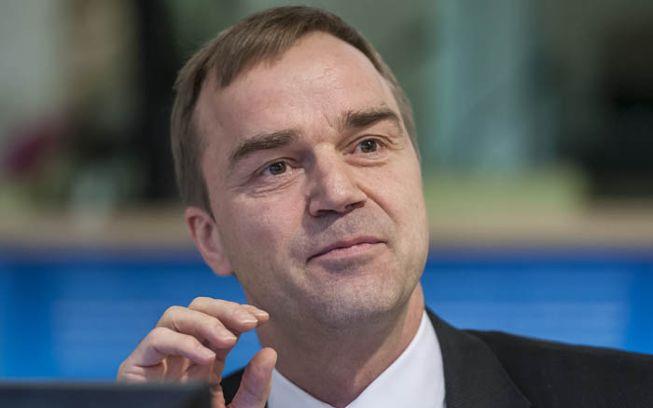By Vassilis Kostoulas
[email protected]
European Stability Mechanism (ESM) board member and top executive Rolf Strauch this week warned that Athens will definitely need the Eurozone organization’s funding over the summer, when several loan repayments are due.
“Without a disbursement from the ESM, the liquidity situation will become very tight. For the repayment that comes in July, the ESM money will be needed,” Strauch told “N”.
Moreover, he emphasized that any decision on whether medium-term debt relief measures are necessary must come after the current adjustment program has been effectively implemented through 2018. The current bailout, the third in a row, ends in August 2018.
Strauch acknowledged that this position is aligned with statements by IMF chief Christine Lagarde made in the wake of her recent meetings with German leadership in Berlin.
The IMF has been increasingly more vocal in its demand for Greek debt relief, as opposed to European creditors.
Strauch, who also serves as the director of research and institutional relations of the European Financial Stability Facility (EFSF), echoed the more austere line by European creditors, namely, that any debt relief should not generate more direct costs in Eurozone member-states’ budgets.
“The key point here is that the review is completed, which is a necessary condition and one in which the Greek government can act upon. The rest is part of the judgment that the ECB will need to make,” he said, in reference to the Greek government’s coveted goal of again including Greek state bonds in the European Central Bank’s Quantitative Easing (QE) stimulus program.
In a thinly veiled gibe at the current leftist-rightist coalition, which first came to power in January 2015 on an electoral “wave” of anti-memorandum sentiment, Strauch said Greece had tentatively re-entered international money markets in 2014.
“If you look back at 2014, Greece had started re-entering the market with a 5-year issue. It was possible then … But right now market access in 2018 is a credible outcome and that is what we are working for,” he said.
Failure to re-enter markets in 2018, he added, would merely shift the focus to “other options”, he said when queried about the prospect of a new program.
Strauch is also the latest top European official to point to the damage in relations between Athens and its creditors over the first half of 2015, when negotiations on behalf of the Greek side were led by flamboyant former finance minister Yanis Varoufakis. His criticism of Varoufakis was followed by kudos for the current Greek finance ministry leadership.
“Obviously what happened in the first half of 2015 under minister Varoufakis was extremely difficult and it caused great rupture. But now it’s fair to give credit to minister (Euclid) Tsakalotos and deputy minister (Giorgos) Chouliarakis for trying to move the programme ahead, always being conscious about the political situation in Greece. The working relationship with the institutions has improved substantially compared to the 2015 period.”
The mercurial Varoufakis has often responded to such high-profile disapproval with his now infamous “I wear the creditors’ loathing with pride” quip.














